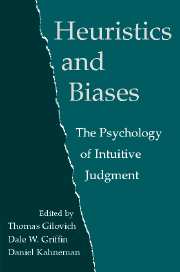Book contents
- Frontmatter
- Contents
- List of Contributors
- Preface
- Introduction – Heuristics and Biases: Then and Now
- PART ONE THEORETICAL AND EMPIRICAL EXTENSIONS
- PART TWO NEW THEORETICAL DIRECTIONS
- 22 Two Systems of Reasoning
- 23 The Affect Heuristic
- 24 Individual Differences in Reasoning: Implications for the Rationality Debate?
- 25 Support Theory: A Nonextensional Representation of Subjective Probability
- 26 Unpacking, Repacking, and Anchoring: Advances in Support Theory
- 27 Remarks on Support Theory: Recent Advances and Future Directions
- 28 The Use of Statistical Heuristics in Everyday Inductive Reasoning
- 29 Feelings as Information: Moods Influence Judgments and Processing Strategies
- 30 Automated Choice Heuristics
- 31 How Good Are Fast and Frugal Heuristics?
- 32 Intuitive Politicians, Theologians, and Prosecutors: Exploring the Empirical Implications of Deviant Functionalist Metaphors
- PART THREE REAL-WORLD APPLICATIONS
- References
- Index
24 - Individual Differences in Reasoning: Implications for the Rationality Debate?
from PART TWO - NEW THEORETICAL DIRECTIONS
Published online by Cambridge University Press: 05 June 2012
- Frontmatter
- Contents
- List of Contributors
- Preface
- Introduction – Heuristics and Biases: Then and Now
- PART ONE THEORETICAL AND EMPIRICAL EXTENSIONS
- PART TWO NEW THEORETICAL DIRECTIONS
- 22 Two Systems of Reasoning
- 23 The Affect Heuristic
- 24 Individual Differences in Reasoning: Implications for the Rationality Debate?
- 25 Support Theory: A Nonextensional Representation of Subjective Probability
- 26 Unpacking, Repacking, and Anchoring: Advances in Support Theory
- 27 Remarks on Support Theory: Recent Advances and Future Directions
- 28 The Use of Statistical Heuristics in Everyday Inductive Reasoning
- 29 Feelings as Information: Moods Influence Judgments and Processing Strategies
- 30 Automated Choice Heuristics
- 31 How Good Are Fast and Frugal Heuristics?
- 32 Intuitive Politicians, Theologians, and Prosecutors: Exploring the Empirical Implications of Deviant Functionalist Metaphors
- PART THREE REAL-WORLD APPLICATIONS
- References
- Index
Summary
The interpretation of the gap between descriptive and normative models in the human reasoning and decision making literature has been the subject of contentious debate since the early 1980s (Baron, 1994; Cohen, 1981, 1983; Evans & Over, 1996; Gigerenzer, 1996; Kahneman, 1981; Kahneman, Slovic, & Tversky, 1982; Kahneman & Tversky, 1983, 1996; Koehler, 1996; Nisbett & Ross, 1980; Stein, 1996), a debate that has arisen because some investigators wish to interpret the gap between the descriptive and the normative as indicating that human cognition is characterized by systematic irrationalities. Due to the emphasis that these theorists placed on reforming human cognition, they have been labelled the Meliorists by Stanovich (1999). Disputing this contention are numerous investigators (termed the Panglossians; see Stanovich, 1999) who argue that there are other reasons why reasoning might not accord with normative theory – reasons that prevent the ascription of irrationality to subjects (Cohen, 1981; Stein, 1996). First, instances of reasoning might depart from normative standards due to performance errors – temporary lapses of attention, memory deactivation, and other sporadic information processing mishaps. Second, there may be stable and inherent computational limitations that prevent the normative response (Cherniak, 1986; Goldman, 1978; Harman, 1995; Oaksford & Chater, 1993, 1995, 1998; Stich, 1990). Third, in interpreting performance, we might be applying the wrong normative model to the task (Koehler, 1996).
- Type
- Chapter
- Information
- Heuristics and BiasesThe Psychology of Intuitive Judgment, pp. 421 - 440Publisher: Cambridge University PressPrint publication year: 2002
- 104
- Cited by



